
Arquivo para December, 2024
Christmas and Herod
The rumor that a Messiah and a Savior would be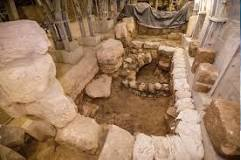 born infuriated Herod, who ruled Judea under the Roman Empire. He ordered the killing of innocent children, persecuted rebels and lived on fury, lust and power; wars today resemble this character from the beginning of the Christian era.
born infuriated Herod, who ruled Judea under the Roman Empire. He ordered the killing of innocent children, persecuted rebels and lived on fury, lust and power; wars today resemble this character from the beginning of the Christian era.
Because of the conflicts over the colonization of the Jews, Herod’s interpretation and that of some religious people was that the Messiah would be a warrior, a “king” and for this reason he ordered them to look for the newborn and without finding him he ordered the killing of the newborns of that time.
The Jews demonstrated because of the high taxes, and after Jesus’ death in 70 AD the second temple was destroyed, according to the Heritage Daily website there is historical evidence that this happened (photo).
It’s no different today, they’re looking for political interpretations of Advent, which announces not only the fact that Jesus was born, but also his second coming (Parousia) and there’s no shortage of Herods who instigate wars and violence, big or small, and hatred is widespread in our time, but for true Christians and also religious people who celebrate Christmas in their own way, it will always be a time of true peace and the coming of Jesus.
In Eastern Europe, in the Gaza Strip and in many other parts of the world, the spirit of Herod lives on, hunting and killing innocents, justifying atrocities with sweetened narratives and even with words that inspire peace and help for needy populations, but they are just narratives.
The spirit of Love and Peace is resilient for those who really want a better world. There will always be warmth and harmony in the homes of those who live according to respect and will have more affection and affection than food, drink and luxurious exaggerations.
True Christmas celebrations will also seek more concrete words and actions of fraternity and will lead minds and hearts towards the resilient spirit of Christmas peace.
Between peace and satiety
The society of fatigue is one that seeks maximum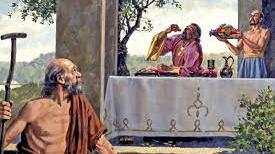 performance, maximum voluptuousness and maximum consumption. It does not lead to peace or happiness, but to stress, depression and, for a large part of the population, exclusion, hunger and misery.
performance, maximum voluptuousness and maximum consumption. It does not lead to peace or happiness, but to stress, depression and, for a large part of the population, exclusion, hunger and misery.
And the peace and “satisfaction” that everyone seeks is not found in exaggerated attitudes of consumption and efficiency, but in that inner wisdom that seeks understanding, love and balance in actions and words, the true peace that every sane man seeks.
Athens was a model of wisdom and wealth, Sparta a model of military discipline and bravery.
A little-known event in history is the Peace of Nicias, an agreement between the Greek cities of Athens and Sparta in 421 BC, establishing a truce between the cities for 50 years, but in 414 BC the agreement was broken and the Peloponnesian War broke out.
Athens possessed the wealth of silver mines and Sparta was famous for its preparation for war. Any coincidence with today’s empires is no coincidence, Athens joined forces with the city of Argos, Sparta’s rival, but they lost the war, and in 405 BC King Pausanias of Sparta ordered the siege of Athens and the starving and exhausted population surrendered.
So models based solely on “wisdom” or “war” are both bankrupt, what is lacking is a spirit of true conciliation between peoples and tolerance between cultures.
The Macedonian and Roman empires also came to an end, so no matter how armed and prepared today’s nations and countries are, it won’t be through arms that they will be able to overcome their enemies.
Fortuna, the Roman goddess of chance, luck and destiny, was blindfolded (like modern justice), because she distributed human plans randomly, so you are happy at random.
Thus, models based solely on “wisdom” or “war” are both bankrupt; what is lacking is a spirit of true conciliation between peoples and tolerance between cultures.
The Macedonian and Roman empires also came to an end, so no matter how armed and prepared today’s nations and countries are, it won’t be through arms that they will achieve “well-being”.
The growth of a greater spirit of understanding and solidarity, which goes beyond the merely logical criteria of reason and wisdom, is the only way to create a climate of peace and satiety.
The fact that many people today seek satiety in drink, food, drugs and other escapes is because we have not yet entered a Civilization of Love, Peace and the solution of social crises.
About the movie Virgin Mary
The first important observation about the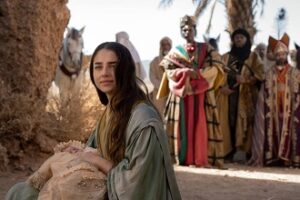 film Virgin Mary, directed by D. J. Caruso (he was also the director of Love of Redemption) and scripted by Timothy Michael Hayes, is that it is not a theological biblical narrative and therefore cannot be seen as an apology for Mary, mother of Jesus (more than 11 million views already).
film Virgin Mary, directed by D. J. Caruso (he was also the director of Love of Redemption) and scripted by Timothy Michael Hayes, is that it is not a theological biblical narrative and therefore cannot be seen as an apology for Mary, mother of Jesus (more than 11 million views already).
Virgin Mary portrays the faith and courage of Mary and Joseph, fleeing to Egypt to save the newborn Jesus in the persecution that King Herod, played by Anthony Hopkins, inflicts on all newborns when he learns that the Messiah promised to the Jewish people has been born.
The speculations about Mary’s childhood and attitudes cannot be seen in the light of the biblical narrative either, but it is important to note that she is not ignored and is venerated in the Bible, both by the angel Gabriel, and if anyone doubts Mary’s importance, just read chapter 1 of Luke, one of the longest, it is all about the birth of Jesus, but especially verses 42-43 (there are several translations) where her cousin Elizabeth greets her: “Blessed art thou among women, and blessed is the fruit of thy womb. Where does this honor come from, that the mother of my Lord should come to me?”.
Having cleared up the problem of the biblical narrative where there is no doubt about Mary’s importance in salvation history, let’s move on to the secular criticisms of the film, curiously one of which is Joseph’s age, even though we find the narrative about him being old, it’s not clear either from a cultural point of view (what was old at the time would probably be old) or from a cultural point of view, although we find the narrative about being old, it’s not clear either from a cultural point of view (what was old at the time was probably between 30 and 40) or from a religious point of view, there is no biblical reference, it’s just a tradition.
The choice of Maria, actress Noa Cohen, has also been criticized for being Israeli, due to the current political climate, but the director clarified that the choice, among several interviews, was immediate and it should be noted that Noa’s darker skin tone was predominant at the time of Jesus.
The idea of deconstructing the biblical narrative because of the nationality of the characters goes far beyond the problem of today’s war, which is undoubtedly cruel because it affects people and not the political, religious or ideological issues that are involved – this was the stance of both the Roman Empire and the Pharisees, the false religionists of that time.
As it’s a fictional movie, the critics should focus on the actors’ performances, the costumes and the plot. I personally liked the movie, but I believe that the religious problems with Mary and the political ones can hinder the appreciation of an artistic work.
The crisis precedes the promising advent
Courage is needed (we’ve already posted here  about the cardinal virtue of “fortitude”) in times of crisis, values, instability, confused social relations and many pre-occupations.
about the cardinal virtue of “fortitude”) in times of crisis, values, instability, confused social relations and many pre-occupations.
It is normal in these personal or social times for the mind to project itself into the past or future, the future generating anxieties and the past remorse or anguish, of course if misinterpreted or misplaced, because in general it is a passage to a promising future, an advent, something to come.
We can’t be suffocated by worries that haven’t materialized yet, but we can’t be so innocent or provincial as to only look at the world around us; life and the world go beyond our own horizons and there is always something promising ahead.
Byung-Chul Han wrote about the Palliative Society: pain today, reflections on the pandemic, but with a broad horizon that saw a society that wants to abolish pain and suffering, but they exist and are an inalienable part of life.
Wars, now with the prospect of a truce (see previous post), a social crisis of values and the loss of many previous conquests, is not just a sign of crisis, it is a sign that something will come, there is an advent that all of humanity is waiting for.
But everyone has their own anxieties, a future that they imagine and even a return to the past, a Paris at its peak that the Christmas lights can inspire, a Lisbon with its good national values (it’s sad that a nationalist is born there).
But this can be a lever for thinking about a sustainable future, a new era in which not only the Eurocentric world is enlightened, but also historically colonized peoples.
In African or African-American culture there are celebrations, which although they also originate in Canada and the Caribbean region, are celebrations that run from December 26 to January 1, Kwanzaa.
The values of community and family unity after a violent Watts riot (caused by police abuse of a young black man in 1966), a black professor Dr. Maulana Karnga, president of the Center for Black Studies at California State University created “matunda ya kwanza”, which means “first fruits”.
This is an example of the birth of a “good fruit” as a result of a crisis, creating a celebration with songs, dances and drumming with African drums, the reading of stories and poetry typical of the culture and a large traditional meal eaten by families or social groups.
Here, the principles of Suali culture (a traditional language in Kenya, but spoken by many African peoples) are recalled, a candlestick (Kinara) is lit with candles of various colors, there they recall the “Harambee” which means “gather all things” and “let’s do it together”.
These principles are no different from good Western culture (the kind that doesn’t colonize and respects local values and cultures), so it’s possible to think of an advent for all of humanity that goes beyond the crises and obstacles of the present.
History, parousia and false prophets
Christmas is coming and the birth of Jesus is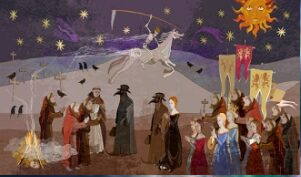 a historical fact, because there was a census ordered by the Roman emperor Caesar Augustus, and Joseph and Mary went to Bethlehem because people had to be counted in their cities of birth. As for the date, there is controversy because it would have been between 4-5 BC, when Quinine was Governor of Syria as described in the Bible (Lk. 2:2), but it is certain that the census was carried out and this was precisely the reason why Mary and Joseph went to Bethlehem, where Jesus would be born.
a historical fact, because there was a census ordered by the Roman emperor Caesar Augustus, and Joseph and Mary went to Bethlehem because people had to be counted in their cities of birth. As for the date, there is controversy because it would have been between 4-5 BC, when Quinine was Governor of Syria as described in the Bible (Lk. 2:2), but it is certain that the census was carried out and this was precisely the reason why Mary and Joseph went to Bethlehem, where Jesus would be born.
There are disputes about the dates and the accuracy of the dates (not the facts), since the calendar was changed by the Roman Empire and there would have been a three-year gap.
History is also punctuated with divine interventions, in the decadence of Rome the monasteries were born, where the culture of cooking, the first guilds and trades and also an earlier phase of printed writing took place, the final period in which the black plague occurred at the end of the 14th century, caused by the Yersinia Pestis bacillus that decimated a large part of the population at the time.
This disease, however, decimated part of the Mongol army fighting the Genoese in the city of Caffa (now Theodosia) on the Crimean Peninsula, and was the beginning of the decline of the great Mongol empire (1209-1368).
We’ve entered modernity, we’ve done some occasional reading in our posts Everyone in the same boat and If Europe wakes up by Sloterdijk, where he mentions Boccaccio’s classic work Decameron as a “small community”.
In a footnote, he quotes from Henrik Siewierki’s “A Mass for the City of Arras” (translated by Brazilian editor: Estação Liberdade in 2001), which analyzes both the psychological and political consequences of the plague. Psychologist Franz Renggli, in his book Self-Destruction by Abandonment, also developed the hypothesis that the plague had an influence on modernity, as well as the degradation of the mother-child relationship, which would have caused a kind of collective, psychosomatic immune weakness that favored the plague virus.
Someone might have thought at the time: it’s the end of times, but it was a big change and also the biblical meaning is that (when you hear about wars, revolutions): “all this must happen, but it is not yet the end” (Mt 24:6).
This whole analysis is interesting, because in the midst of the recent Pandemic (the current plague), while it was undoubtedly a scourge, it can nurture a new glade over our community (a word used by Sloterdijk), that is, the idea of mutual defense and solidarity in view of a catastrophe even greater than the one that happened.
It serves to “smooth the way”, as the Bible reading says when John, the son of Zechariah and Elizabeth, proclaimed in the desert using the words of the prophet Isaiah: “This is the voice of him who cries out in the desert: ‘Prepare the way of the Lord, make his paths straight’” (Lk 3:4) and it seems appropriate for this time of scourge and desert.
It’s important to remember that the first two weeks of Christmas commemorate not the coming of Jesus, but the new coming of the Lord.
End of wars and the magic of Christmas
Can this time of year infect the world in such a way 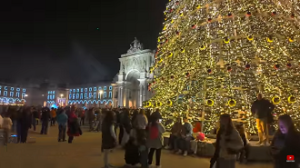 as to turn the tide of war, the scenario of this first week of December seems to say yes.
as to turn the tide of war, the scenario of this first week of December seems to say yes.
The dictator of Syria, Bashar al-Assad, who ruled Syria for almost a quarter of a century, has fallen. While the London Observatory for Human Rights says that he fled in a private plane, the Russian Foreign Ministry, a traditional ally, has declared that he has “resigned”.
The leader of a coalition of opponents, Abu Mohammed al Jolani (he now goes by his real name Ahmed Al-Shara), led the Organization for the Liberation of the Levant (Hayat Tahir al Sham, or just HTS), from extremist origins (he was linked to Al Qaeda) and adopted a more moderate stance, gaining allies.
Syria’s Prime Minister, Mohamed Ghazi al-Jalali, has declared himself willing to collaborate with the insurgents, saying that he will extend his hand to “any Syrian who is interested in the country in order to preserve its institutions”, but it is likely that he will also resign or be removed from office.
Talks are also progressing under the patronage of US President-elect Donald Trump, a meeting with President Makron of France and Zelensky of Ukraine, and the international scene has been gripped by the prospect of peace that is now apparently possible.
In Latin America, at a meeting in Montevideo last Friday (6/12), after 25 years of negotiation, the leaders of the South American bloc signed an agreement with the European Union. For Brazil, the agreement makes strategic sense to promote learning and improvement in how our productive sectors generate commodities, which are the primary goods in the production sector: agricultural, livestock, mineral and environmental, in which the country is abundant.
In short, everything seems to be building a new harmony and fostering the Christmas atmosphere, but we need a lasting peace where the sectors involved don’t feel “defeated”, we need a balanced global economy without protectionism or unfair competition and, above all, we need a frontal attack on serious social and environmental issues.
Christmas exists, the beautiful illuminations in Lisbon (video), for exemple, and many others across Europe are trying to recapture a climate of hope and peace, there’s even a movie from the film industry (it’s not a theological movie) about the Virgin Mary (it was released on September 6th) and therefore the birth of Jesus.
Wisdom and humility
Those who claim to be great, or who receive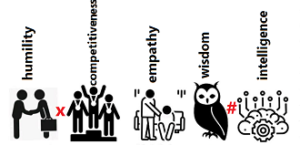 great honors, are not great; in fact, they are more linked to temporal power than to divine wisdom, they are only those who are content with passing joys and honors, often linked only to self-interest.
great honors, are not great; in fact, they are more linked to temporal power than to divine wisdom, they are only those who are content with passing joys and honors, often linked only to self-interest.
Other words that correlate with true humility include: naturalness, simplicity, simplicity, unpretentiousness, dispassion and detachment. In today’s world of immediate and fleeting narratives, they are clearly linked to pretension and affectation.
Another misconception that is more difficult to understand are the everyday correlates of humility, such as: submission, obedience, respect, compliance, subjection and passivity. This refers to people who are humble, but have difficulty discerning, even though obedience is a praiseworthy virtue, it can become subservient and harmful.
In the book Near to the Wild Heart (Perto do coração selvagem), the writer Clarice Lispector wrote: “I accept everything that comes from me because I have no knowledge of the causes and it is possible that I am stepping on the vital without knowing it, that is my greatest humility,” so one can be consciously obedient.
The former prime minister of Israel (1969-1974), Golda Meyer, once said to Moshe Dayan, a military man and politician at the time: “Don’t be humble, you’re not as important as you think”.
The vice that opposes humility is pride. There are many proud, vain, false prophets, Pharisees or just worldly people who have this vice. In biblical terms, it was pride that made one of the archangels of the high hierarchy want to be equal to God; the part contains part of the Whole, but it is not the Whole, and the narrative that everything is fragmentary is also false.
In all the biblical passages in which Jesus performs miracles, he always says to the interlocutor: “your faith has saved you”. The proud, Pharisees and idolaters want to attribute to themselves or their group the divine interventions in which they only participate in the invocation, and many of them don’t believe that the invocation is valid and so they condemn the intercessors, even though they do the same.
Pride explains many evils: war, greed, not caring for those in need, disrespect for nature (wanting to dominate it) and especially power and disrespect.
So humility is the effective antidote to all these evils: we are no more or better than anyone else, but we each have our own uniqueness and our own purpose.
Courage, Christmas and the house on the rock
In philosophy, the Englishwoman Philippa Foot dealt with this aspect of moral ethics and for this reason her ethics became known as virtue ethics. We’ve done some previous posts on this, but how does it relate to Christmas and the “house on the rock”?
dealt with this aspect of moral ethics and for this reason her ethics became known as virtue ethics. We’ve done some previous posts on this, but how does it relate to Christmas and the “house on the rock”?
To face dangers and even trials (and provocations) is to be well aligned with the other two cardinal virtues: prudence and wisdom, as well as justice, but we have already said that the “just” in the Bible is not human justice, which is merciless and legalistic, because the divine contemplates mercy and forgiveness, and without it even human judges would be condemned.
Courage (or fortitude) is accompanied by prudence, the ability to pass or remove obstacles in life in order to overcome them so as not to reproduce hatred, violence and revenge, and so must produce and be led by wisdom, which is not just culture and good reading, it is looking at the Other with the dignity they have.
This is the spirit of Christmas, which commemorates the birth of the Prince of Peace, the one who was also judged and condemned by human justice (that of the ‘religious’ Pharisees and the Roman Empire, Pilate who washed his hands of it), but did not fear to speak The Truth.
In all languages and nations, this desire for love, peace and harmony between peoples never dies, but keeping it alive depends on the virtue of fortitude, and keeping it for life implies doing what gives meaning to “building the house on the rock” (Mt 7: 24-27).
This virtue emphasizes the fortitude (courage) to stand firm over life and the purpose of not giving in to contemporary inclinations: consumerism, immorality, injustices (small and large), unbelief, political and ideological hatred and recklessness.
This is not just a date, but it is a good reference for us to remember these human traits that give hope for a happier and more harmonious future civilization, an everlasting Christmas.
There’s a mood for Christmas
Among true Christians, yes, there will always be hope for a better world, where everyone can enjoy the common good, true (and impartial) justice and the humblest remembered and invited to this moment of peace and fraternization.
hope for a better world, where everyone can enjoy the common good, true (and impartial) justice and the humblest remembered and invited to this moment of peace and fraternization.
Certainly, in many parts of the world, especially among those suffering from war, scourges or misery and hunger, there will always be less peace and joy among them.
However, this should not be an obstacle to the search for the good, to reflection on the true values that make the civilizing process of humanization ever more advanced and promising, it is not utopia, it is the only possible horizon for those who are true humanists, those who do not look at the different with prejudice and disrespect.
Not limited to any social, cultural or religious group, true humanists create bonds of fraternity and bridges, not insurmountable chasms of agreements and dialogues.
There are more unacceptable things, yes war is unacceptable, there are always two groups willing to fight, there is no difference that should not be respected, yes social inequality is unacceptable, but we can get everyone to think about it and find solutions without demagoguery.
These great things are not just the result of advanced cultural reading, above all we need a feeling of solidarity, a deep look at the Other, who is neither a mirror nor the result of an allegorical or demagogic discourse, we must respect it in all its dignity.
There is a true wisdom that is guided by loving gazes on humanity as a whole and on each man (or woman) in particular, it is accessible to all minds and cultures, and can chart a path of peace and fraternity.
This Christmas is not specific to one date of the year, but it is important to remember it on this date, even religious currents that don’t celebrate it fail to recognize its importance.
There is always hope for peace, lasting joy and social justice for those who love.
It’s important to remember it on this date, even the religious currents that don’t celebrate it fail to recognize its importance.
There is always hope for peace, lasting joy and social justice for those who love.
And Europe hasn’t woken up
The creation of the euro, despite the controversial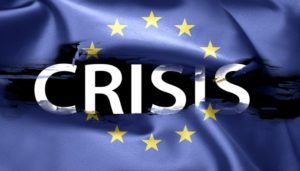 exit of England, not the United Kingdom, because Scotland tried to make a referendum on the issue and the British Parliament rejected it, the attempt to create a European concept and policy did not fail, it just did not advance in the essentials.
exit of England, not the United Kingdom, because Scotland tried to make a referendum on the issue and the British Parliament rejected it, the attempt to create a European concept and policy did not fail, it just did not advance in the essentials.
Its deep humanist and cultural roots were suffocated by idealist and Enlightenment ideologies.
Sloterdijk’s book Se a Europa despertar (If Europe wakes up, in branzilian version) outlines the essentials of what the real Europe would be, its borders and its ethnic bases, what its practically abandoned religious identity would be, it’s not immigration that’s undermining this vision of identity and unity, but the question Sloterdijk asks in his book is what scene do Europeans draw in their decisive historical moments? What ideas animate them, what illusions mobilize them? And it’s not difficult to point out their misconceptions, both in terms of ethnic and cultural bases.
Father Manuel Antunes, too, in his book Repensar Portugal (Rethinking Portugal), written before the European Union, said that his country should turn towards Europe, that before it was a little corner of Europe that turned its back on it and turned towards its African colonies.
Colonization and wars, intestinal, because there were religious wars at the end of the Renaissance, and the Peace of Westphalia, a treaty that removed the religious question from the disputes, but Europe had other border and ethnic disputes, until it culminated in two world wars.
They ended up involving the whole world, because there are interests that go beyond borders, but we have to understand that a true European identity and unity has not yet been built, the borders have been opened, but now they seem uncertain and threatened by the involvement in the war in Eastern Europe.
Sloterdijk’s main thesis in this book is that the model of colonization that gave Europe the idea of an Empire of the Centre (as the author calls it) opened up a vacuum in the post-war period that created a generation of intellectuals who sought a new imperial model, so the author concludes that it has failed to understand that it is no longer a center and has difficulty with this.
The wars are therefore a way of bringing back the idea of empire, the opposite of what Sloterdijk proposed in his book, which would be to abandon this model. This is also the conclusion of Father Manuel Antunes, who adds a model of “social democracy” to Portugal.
Sloterdijk, P. (2002) Se a Europa despertar. Trad. José Oscar de Almeida Marques. Brazil, São Paulo: Estação Liberdade.

